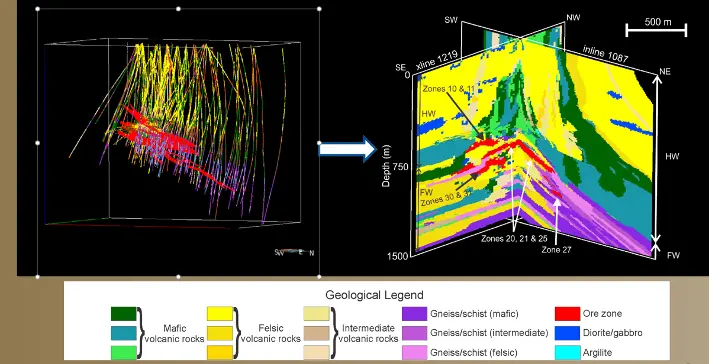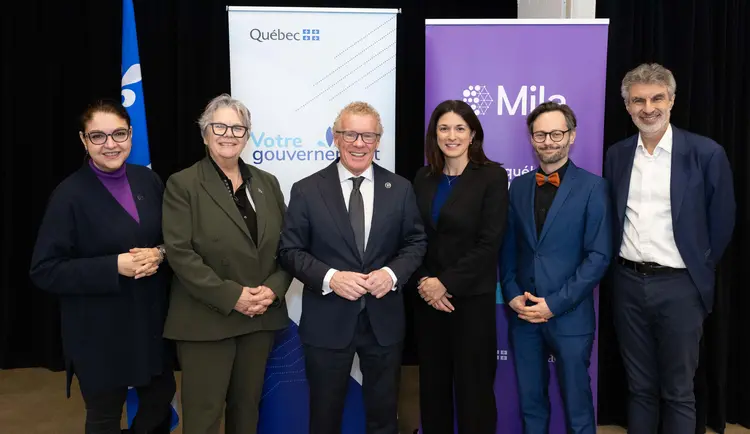
Montreal, QC, May 17, 2021 –Mila – Quebec Artificial Intelligence Institute announces its new collaborative project with the Geological Survey of Canada (GSC), an integral part of Natural Resources Canada’s (NRCan) Lands and Minerals sector, to leverage the potential of AI for the optimization of mineral exploration in Canada. Through July 2022, this research partnership will target seismic and borehole data to develop advanced models and methods for understanding and visualizing large sub-surface volumes. This approach has the potential to transform the exploration of mineral resources by allowing a more precise and faster analysis of sites of interest.
“We are excited to apply state-of-the-art deep learning methods to improve mineral exploration in Canada. This project involves several interesting scientific challenges including dealing with noisy labels and out-of-distribution generalization. Our collaboration with the Geological Survey of Canada will be conducted in line with Mila's mission to transfer knowledge and knowhow to its collaborators.” – Joumana Ghosn, Director, Applied Machine Learning Research, Mila.
Natural Resources Canada (NRCan) research scientists Dr. Gilles Bellefleur and Dr. Ernst Schetselaar will be joining forces with Jean-Philippe Nantel (Project Manager), Joumana Ghosn, Pierre-Luc St-Charles and Bruno Rousseau from the Applied Research Team at Mila. This interdisciplinary team’s combined strengths will enable them to apply sophisticated deep learning methods toward improving the process of finding mineral resources deep underground.
The Case of Seismology and Geology in Canada
When searching for new mineral deposits worth exploring in Canada, geologists must often dig boreholes that extend two kilometres or more, making the process of drilling one of the most expensive aspects of mineral exploration. In seismic exploration, spatial devices (typically corresponding to explosive charges) are spread across the surface site and used to create shock waves. Those shock waves are reflected by the rocks present at the site, which will respond differently to the seismic waves based on the rock’s density and elasticity.
In turn, borehole drilling brings up rock samples that are extracted from deep underground. Geologists analyze these core samples for properties such as texture, composition and the concentration of valuable minerals. With enough samples, it becomes possible to generate 3D models to accurately predict what lies beneath the surface of the earth.
In this project, Mila and the GSC will consolidate their expertise and use both seismic and borehole data to create deep learning models that will predict the subsurface rock composition using seismic information alone, thus significantly reducing the number of boreholes needed and ultimately leading to a more cost-effective, sustainable, and accurate exploration method.
For more information about the project:
Ludovic Soucisse
Head of Communications and Public Affairs
Mila
514 378-8425
About NRCan and the GSC
The Geological Survey of Canada (GSC) is part of the Lands and Minerals Sector of Natural Resources Canada. The GSC is Canada’s oldest scientific agency and one of its first government organizations. Throughout its long and colourful history, the GSC has played a leading role in exploring the nation and building a competitive resource advantage for Canadians. Today, the GSC is Canada’s national organization for geoscientific information and research. Its world-class expertise focuses on the sustainable development of Canada’s mineral, energy and water resources; stewardship of Canada’s environment; management of natural geological and related hazards; and technology innovation.
About Mila
Founded by Professor Yoshua Bengio of the Université de Montréal, Mila is a research institute in artificial intelligence which rallies about 500 researchers specializing in the field of deep learning. Based in Montreal, Mila’s mission is to be a global pole for scientific advances that inspires innovation and the development of AI for the benefit of all. Mila is a non-profit organization recognized globally for its significant contributions to the field of deep learning, particularly in the areas of language modelling, machine translation, object recognition and generative models.





